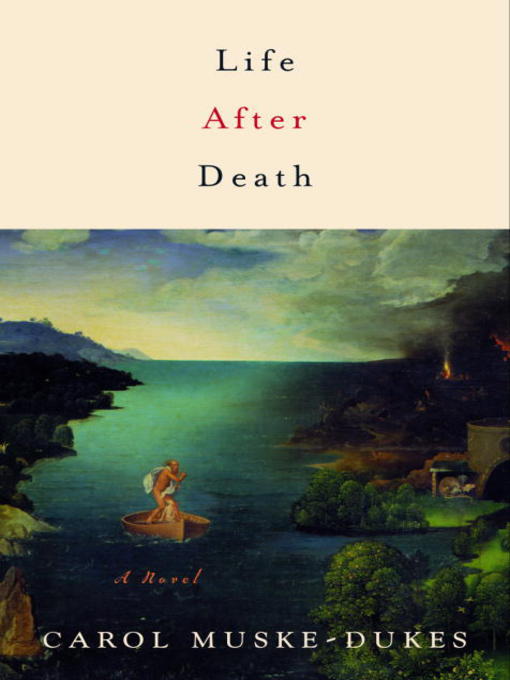
Life After Death
A Novel
- اطلاعات
- نقد و بررسی
- دیدگاه کاربران
نقد و بررسی

Starred review from April 23, 2001
"I'm stronger than my own power to destroy. That's my motto now," says Boyd Schaeffer, the protagonist of Muske-Dukes's latest novel (after Saving St. Germ; Dear Digby). Like a fairy tale, Boyd's story begins with a careless but fateful event: a curse uttered during an argument with her insidiously charming husband, Russell, who reveals to her that he believes he is dying. Boyd wishes aloud that he would
die, since she suspects him of getting drunk and briefly losing their daughter, Freddy, at the park. It turns out Russell wasn't exaggerating, as his death on the tennis court of their St. Paul home the next day proves. Forty-two-year-old Russell seemed to have everything—money, looks, sensitivity. But the two things he really wanted—the unconditional love of his wife and literary renown—evaded his grasp. His death leaves Boyd with a question and a ghost: who was Russell? Boyd goes back into medicine (a field she left years earlier, after a patient died during an abortion procedure), snubs just about everyone she knows and becomes progressively more bewildered by her own grief as she tries to understand better the circumstances surrounding Russell's death. Boyd is not what one would call likable—she's confrontational, stubborn and irascible—but it's hard not to be won over by her. Her foil in the novel is Will Youngren, the funeral-home owner who buries Russell. Her quest for the meaning of her husband's life mirrors Will's need to end his own long mourning for his dead twin sister, and the two begin to find strength and support in each other. Muske-Dukes, who is also a poet (An Octave Above Thunder, etc.), has shaped an exquisitely written tale with raw emotional appeal, a deeply humanistic story of death, grief and survival. 5-city author tour.

June 1, 2001
In the latest from poet and novelist Muske-Dukes (Dear Digby), Boyd Schaeffer tells her husband to die and he does. When they quarreled, she never dreamed that the very next day Russell would have a fatal heart attack, leaving Boyd and their young daughter, Freddy, to cope without him. Russell was rich, charming, and not all that reliable, and his marriage to Boyd was less than perfect. His death brings up some of Boyd's past issues with death, including the time she was an obstetrician in New York City and a woman died in her care. When Boyd married Russell, she returned to Minnesota, leaving her career behind. Will, the undertaker who handles Russell's burial, attempts to befriend Boyd. But Will, too, is haunted by a past death that of his fraternal twin sister, Signe. The novel is rounded out by Russell's wealthy, enigmatic mother, Gerda, and Griggs, the eccentric embalmer who works for Will. These well-developed characters affect one another throughout the uneven narrative as they deal with issues of death and how to keep on living. The novel doesn't always flow smoothly, but this doesn't detract from a story to which many readers will relate. Recommended for public libraries. Robin Nesbitt, Columbus Metropolitan Lib.
Copyright 2001 Library Journal, LLC Used with permission.

Starred review from May 15, 2001
Boyd was just a step away from becoming an obstetrician-gynecologist when her career was derailed by two people: the charming, wealthy, and mercurial Russell and a mother of three who died while intern Boyd performed an abortion. Her death is not Boyd's fault, but it prompts her to abandon her career and marry Russell, with whom she has a daughter, Freddy. Her life would be idyllic, except for the regret and the anger. One night Russell so enrages Boyd that she tells him to die, and he does. Boyd goes into shock: more guilt, another ghost. Meanwhile her elegant mother-in-law has her own transgressions to cope with, and four-year-old Freddy convinces herself that she can liberate her daddy from his underground abode. Boyd finds herself drawn to Will, who gave up his dream of being an architect to run his family's St. Paul mortuary and who is also haunted by his dead. These are the parameters within which Muske-Dukes, an astute and poetic novelist, works her magic. As in " Saving St. Germ" (1993), her characters are charismatic, and her musings on grief, ritual, the quandaries of abortion, and questions of responsibility charge this riveting, gently humorous, and prismatically beautiful novel.(Reprinted with permission of Booklist, copyright 2001, American Library Association.)




دیدگاه کاربران